The power of music, narrative and drama is of the greatest practical and theoretical importance. One may see this even in the case of idiots, with IQs below 20 and the extremest motor incompetence and bewilderment. Their uncouth movements may disappear in a moment with music and dancing—suddenly, with music, they know how to move. We see how the retarded, unable to perform fairly simple tasks involving perhaps four or five movements or procedures in sequence, can do these perfectly if they work to music—the sequence of movements they cannot hold as schemes being perfectly holdable as music, i.e. embedded in music. The same may be seen, very dramatically, in patients with severe frontal lobe damage and apraxia—an inability to do things, to retain the simplest motor sequences and programmes, even to walk, despite perfectly preserved intelligence in all other ways. This procedural defect, or motor idiocy, as one might call it, which completely defeats any ordinary system of rehabilitative instruction, vanishes at once if music is the instructor. All this, no doubt, is the rationale, or one of the rationales, of work songs.


